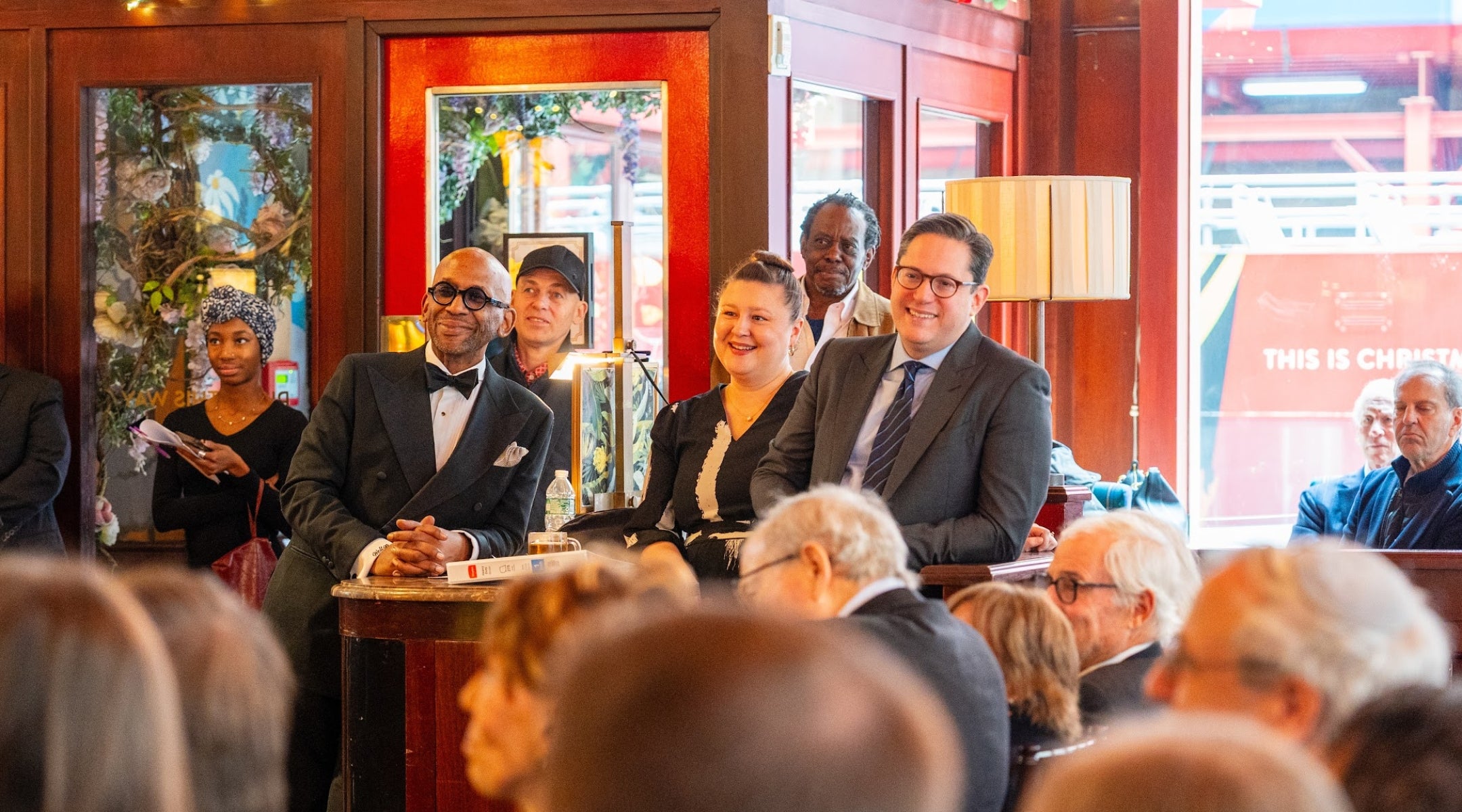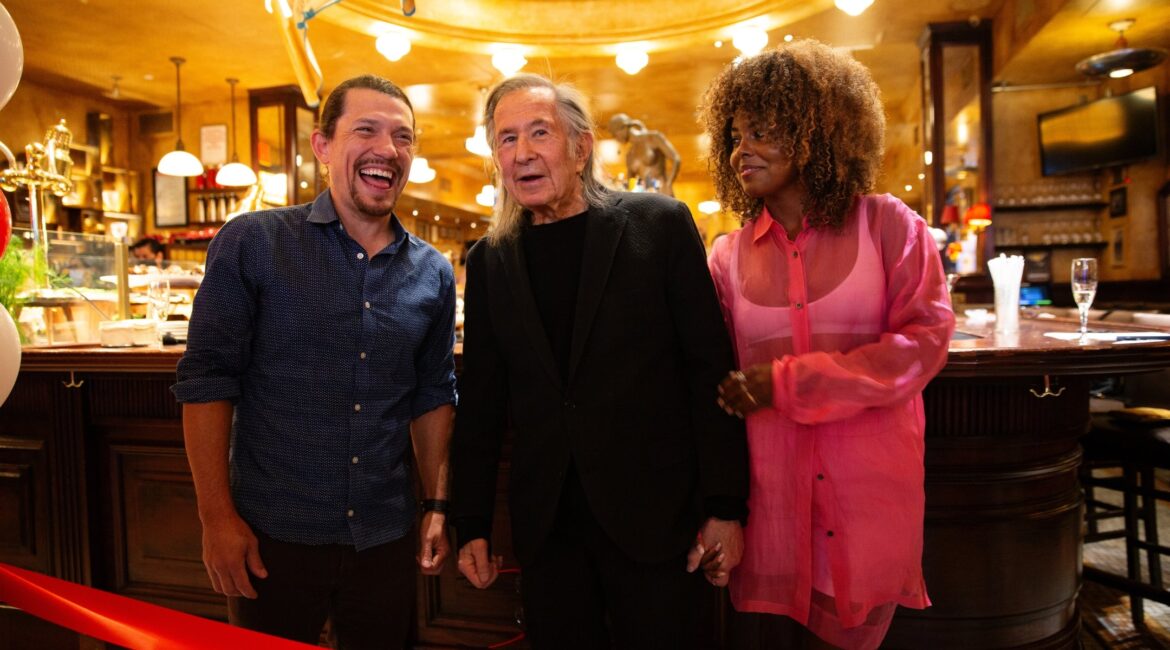Shelly Fireman, the legendary New York City restauranteur who parlayed a bagel shop he opened in 1963 into an influential restaurant empire, was coming up with new business ideas until the week he died.
“Shelly was incredible,” recalled Fireman’s longtime friend and business partner Bill Berkley on Wednesday. “Roughly five days before Shelly passed away, he called me up, and said, ‘I’m so tired. By the way, how are you feeling, Bill?’ I said, ‘I’m OK, thanks, Shelly, how are you?’ He says, ‘I’m so f–king tired. I don’t know why! But I’m working on a new menu, and I have an idea for a new restaurant location. Maybe we can talk next week. I’ll see you shortly.’”
Berkley shared the recollection at a memorial event held at Fireman’s Midtown seafood restaurant Redeye Grill, where hundreds of friends, family and industry folk gathered to share their memories of the Jewish restauranteur.
Fireman died last month at 93, more than six decades after opening The Hip Bagel and 51 years after launching Cafe Fiorello, which helped turn high-brow Italian food mainstream among New Yorkers. At the memorial service — which was followed by a bagel brunch — he was remembered as a successful businessman, loyal friend and lover of the arts.
Ben Grossman, the CEO of the Fireman Hospitality Group, which oversees 10 restaurants founded by Fireman, including USA Brooklyn Delicatessen and Trattoria dell’Arte, led the service.
“Like most of our conversations, I’m going to give Shelly the first word and the last word,” Grossman said, before introducing a video tribute that included clips from a 2010 interview in which Fireman described both the heady early days of his bagel shop and his own business acumen.
“The guys used to make bagels with their shirts off — think about it! They were shvitzing all over!” Fireman said in the clip, to an eruption of laughter around the room. “And I say, ‘There’s something going to be — the bagel has a future.’ Where it’s going, what it’s going to do, I don’t know.”
It turns out, Fireman was onto something — the bagel did have a bright future. Fireman, who had previously worked in the garment business, learned all he could about the restaurant industry by checking out books from the New York Public Library. In 1963, opened his first restaurant, a 24/7 bagel shop in Greenwich Village called Hip Bagel.
Once described as the “unofficial headquarters of the city’s in-crowd,” the shop was frequented by the likes of Bob Dylan, Barbra Streisand, Andy Warhol, Mark Rothko and Lenny Bruce. It was mentioned by name in Woody Allen’s 1972 film “Play it Again, Sam.”
In addition to bagels, a popular dish at the eatery was Jell-O made by Fireman’s mother. “She made the best Jell-O in the world, with nuts and fruits and raisins. She would make it in the Bronx, schlep it down on the D-Train and bring it to me twice a week, in big pans,” Fireman told Patch in 2019. “I called it ‘Grandma Hipstein’s Jell-O. And people loved it.”
From there, Fireman went on to launch more than a dozen establishments. Some of them — such as the West 51st Street steakhouse The Tin Lizzie, which at one point was one of the highest-earning restaurants in the United States — have since closed. But others, including the Times Square Italian restaurant Bond 45, are flourishing. It opened a second location in Washington, D.C., in 2010.
Known for being attuned to diners’ preferences, Fireman opened two restaurants, Brooklyn Delicatessen and Brooklyn Diner, in Midtown to trade on the Brooklyn name and served up a wide array of foods across his eateries.
“I have fish for people who want to eat fish. I have a sushi place for people who want to eat sushi. I have steak places for people who want to eat steak,” Fireman said in the video tribute. “And I got matzah ball soup for people who want to eat matzah ball soup!”
Artist representative Gene Luntz — a longtime friend who spoke at the memorial, despite having a black eye and stitches from an accident over the weekend — shared fond memories of Fireman from his involvement in the art scene.
“I’ll never forget Shelly’s phone calls,” Luntz said, before imitating Fireman’s gruff voice. (He was not the first, nor the last, to do an impression of Fireman throughout the service.) “‘Hey, Gene, it’s Shelly! Where are we having lunch tomorrow? I‘m buying!’ That was Shelly.”

Loved ones gathered at a memorial for New York restaurateur Shelly Fireman. (Sunshine Sachs)
Fireman was also a shrewd businessman, his colleagues recalled, pioneering ideas like locating his restaurants near cultural hubs in order to attract Theater District and Lincoln Center pre-show crowds.
“When you saw Shelly at his best, it was unbelievable,” said Berkley, who served as best man at Fireman’s wedding to his wife, Marilyn, in 1970.
“There were moments when he wasn’t at his best, and it was tough,” he added, to knowing nods across the room.
Several speakers speakers, many of whom worked with the restaurateur for decades, shared anecdotes of being fired and rehired by Fireman — multiple times.
“I, by the way, only got fired three times,” Fireman’s son, John, said at the memorial. “So that’s the privilege of being a family member.”
Loved ones recalled Fireman as someone who also loved art and pursued sculpture in his free time; some retold the crude jokes of which Fireman was fond. They remembered how he plugged into his vast celebrity and artist network to incorporate eye-catching works into his restaurants, such as the two giant bronze shrimp sculptures at the Redeye Grill (only one of which remains today) and the celebrity “nose gallery” at Trattoria dell’Arte.
Fireman also employed at least one celebrity before he was famous: For one day in the 1970s, Tony and Emmy award-winning Jewish actor and singer Mandy Patinkin was a busboy and “mousser” at Cafe Fiorello — someone who stood outside offering samples of chocolate mousse samples in an effort to attract customers. Patinkin successfully convinced Fireman to rent him a Bullwinkle moose costume to wear on the job, but the next day he landed the acting job that launched his career. Today, Patinkin has his own reserved table and plaque at Cafe Fiorello.
A Bronx native — Fireman was born to Jewish parents in 1931; his father worked for the garment industry — Fireman lived above Cafe Fiorello, according to the New York Times. He also had a home in Tuscany, where he summered for more than 30 years, though he would return to New York in the fall in order to celebrate the Jewish High Holidays.
“He emotionally felt he was Italian,” Grossman told The New York Times.
Nonetheless, “Shelly was a true New Yorker — he loved this city to the core,” Andrew Rigie, executive director of the New York City Hospitality Alliance, said at the memorial.
“Restaurants like Shelly’s helped define our city and our city’s times — they add texture and richness to the countless people’s lives who they create so many memories for inside their walls,” Rigie added. “Shelly Fireman and his restaurants are one of the reasons people love New York City, and you will always forever hold a special place in our industry, in our city and in the hearts of so many.”
Power local Jewish news that matters to you. Your year-end donation ensures we can document the essential stories for Jewish New Yorkers, from City Hall to your local bagel shop.


Dining and Cooking